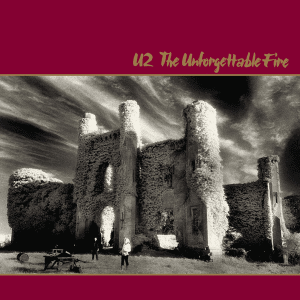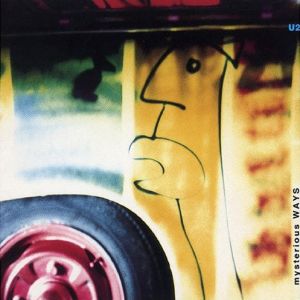
U2 are an Irish rock band formed in Dublin in 1976. The group consists of Bono, the Edge, Adam Clayton, and Larry Mullen Jr.. Initially rooted in post-punk, U2's musical style has evolved throughout their career, yet has maintained an anthemic quality built on Bono's expressive vocals and the Edge's chiming, effects-based guitar sounds. Bono's lyrics, often embellished with spiritual imagery, focus on personal and sociopolitical themes. Popular for their live performances, the group have staged several elaborate tours over their career.

The Unforgettable Fire is the fourth studio album by Irish rock band U2. It was produced by Brian Eno and Daniel Lanois, and released on 1 October 1984 by Island Records. The band wanted to pursue a new musical direction following the harder-hitting rock of their previous album, War (1983). As a result, they employed Eno and Lanois to produce and assist in their experimentation with a more ambient sound. The resulting change in direction was at the time the band's most dramatic. The album's title is a reference to "The Unforgettable Fire", an art exhibit about the atomic bombing of Hiroshima.

"Stuck in a Moment You Can't Get Out Of" is a song by Irish rock band U2. It is the second track on their tenth studio album, All That You Can't Leave Behind (2000), and was released as the album's second single on 29 January 2001. The band's lead vocalist Bono has said the song was inspired by a fictional conversation with his friend Michael Hutchence about suicide. The song peaked at number 52 on the US Billboard Hot 100 and topped the charts in Canada, their native Ireland and Italy, while reaching the top 10 in Australia, Denmark, Finland, the Netherlands, Norway, Spain and the United Kingdom. In 2002, the song won the Grammy Award for Best Pop Performance by a Duo or Group with Vocal at the 44th Annual Grammy Awards ceremony.

"Where the Streets Have No Name" is a song by Irish rock band U2. It is the opening track from their 1987 album The Joshua Tree and was released as the album's third single in August 1987. The song's hook is a repeating guitar arpeggio using a delay effect, played during the song's introduction and again at the end. Lead vocalist Bono wrote the lyrics in response to the notion that it is possible to identify a person's religion and income based on the street on which they lived, particularly in Belfast. During the band's difficulties recording the song, producer Brian Eno considered erasing the song's tapes to have them start from scratch.

"With or Without You" is a song by Irish rock band U2. It is the third track on their fifth studio album, The Joshua Tree (1987), and was released as the album's lead single on 16 March 1987. The song was the group's most successful single at the time, becoming their first number-one hit in both the United States and Canada by topping the Billboard Hot 100 for three weeks and the RPM national singles chart for one week, with a further three weeks at number two.

"I Still Haven't Found What I'm Looking For" is a song by Irish rock band U2. It is the second track from their 1987 album The Joshua Tree and was released as the album's second single in May 1987. The song was a hit, becoming the band's second consecutive number-one single on the US Billboard Hot 100 while peaking at number six on the UK Singles Chart.

"Mysterious Ways" is a song by Irish rock band U2. It is the eighth track from their 1991 album, Achtung Baby, and was released as the album's second single on 2 December 1991. The song began as an improvisation called "Sick Puppy", with the band liking only the bass part that bassist Adam Clayton composed. The band struggled to build a song from it, with vocalist Bono and producer Daniel Lanois arguing intensely during one songwriting session. The song's breakthrough came after guitarist the Edge began experimenting with the Korg A3 effects unit. "Mysterious Ways" features a danceable beat, funky guitar hook, and conga-laden percussion, as well as mystical lyrics by Bono about romance and women.

U2 Go Home: Live from Slane Castle, Ireland is a concert film by Irish rock band U2. It was filmed on 1 September 2001 at Slane Castle in County Meath, Ireland, during the European leg of the group's Elevation Tour. The video was released on DVD in November 2003. Although Slane Concerts at the castle are traditionally held once a year, U2 played two concerts; the second one was filmed for the video, and was the band's final show on the European leg of the tour. U2 Go Home was the second of two concert videos from the tour, preceded by 2001's Elevation 2001: Live from Boston.
"Running to Stand Still" is a song by rock band U2, and it is the fifth track from their 1987 album, The Joshua Tree. A slow ballad based on piano and guitar, it describes a heroin-addicted couple living in Dublin's Ballymun flats; the towers have since become associated with the song. Though a lot of time was dedicated to the lyrics, the music was improvised with co-producer Daniel Lanois during a recording session for the album.
"Bullet the Blue Sky" is a song by Irish rock band U2, and is the fourth track from their 1987 album The Joshua Tree. Lyrically, the song was inspired by a trip that lead vocalist Bono made to Nicaragua and El Salvador, where he saw firsthand how local peasants were affected by United States military intervention in the region. Angered by what he witnessed, Bono asked guitarist the Edge to "put El Salvador through an amplifier." "Bullet the Blue Sky" is one of the band's most overtly political songs, with live performances often being heavily critical of political conflicts and violence.
"Until the End of the World" is a song by rock band U2 and the fourth track from their 1991 album Achtung Baby. The song began as a guitar riff composed by lead vocalist Bono from a demo, which the band revisited with success after talking with German filmmaker Wim Wenders about providing music for his film Until the End of the World. The song's lyrics describe a fictional conversation between Jesus Christ and Judas Iscariot. The first verse discusses the Last Supper; the second is about Judas identifying Jesus with a kiss on the cheek in the Garden of Gethsemane; and the final is about Judas' suicide after being overwhelmed with guilt and sadness.
"Bad" is a song by Irish rock band U2 and the seventh track on their 1984 album, The Unforgettable Fire. Thematically, the song is about heroin addiction, though lead vocalist Bono has given varying accounts of who was the inspiration behind his lyrics. "Bad" is considered a fan favourite and is one of U2's most frequently performed songs in concert. The band's 12-minute performance of the song at the Live Aid charity concert in 1985 was a breakthrough moment for them.
"Yahweh" is a song by rock band U2 and the eleventh track on their 2004 album How to Dismantle an Atomic Bomb. It was mainly recorded in one take, and was performed live by the band during the Vertigo Tour. The song received mixed reviews from critics.
"Peace on Earth" is a song by rock band U2 and the eighth track on their 2000 album All That You Can't Leave Behind. Its lyrics were inspired by the Omagh bombing in Northern Ireland on 15 August 1998.
"New York" is the tenth track from U2's 2000 album, All That You Can't Leave Behind. It is notable as the subject matter is a picturesque description of New York City and of the people who live there, and was later altered following the events of September 11, 2001. The song's lyrics were written by lead singer Bono, who has a residence in New York City.
"One Step Closer" is a song by Irish rock band U2, and is the ninth track on their 2004 studio album, How to Dismantle an Atomic Bomb.
"In a Little While" is a song by Irish rock band U2 and the sixth track on their 10th studio album, All That You Can't Leave Behind (2000). Although it was not released as a single from the album, it became a hit on adult album alternative radio in the United States, reaching number one on the Billboard Triple-A chart for a single week in March 2002.
"A Sort of Homecoming" is a song by Irish rock band U2, and is the opening track on their 1984 album, The Unforgettable Fire. A live version of the track is found on 1985's four-track EP, Wide Awake in America.
"Mothers of the Disappeared" is a song by Irish rock band U2. It is the eleventh and final track on their 1987 album The Joshua Tree. The song was inspired by lead singer Bono's experiences in Nicaragua and El Salvador in July 1986, following U2's participation in the Conspiracy of Hope tour of benefit concerts for Amnesty International. He learned of the Madres de Plaza de Mayo, a group of women whose children had "forcibly disappeared" at the hands of the Argentine and Chilean dictatorships. While in Central America, he met members of COMADRES, a similar organization whose children had been abducted by the government in El Salvador. Bono sympathized with the Madres and COMADRES and wanted to pay tribute to their cause.
"Exit" is a song by rock band U2. It is the tenth track on their 1987 album The Joshua Tree. "Exit" was developed from a lengthy jam that was recorded in a single take and edited down to a shorter arrangement. The lyrics, which portray the mind of a serial killer, were inspired by lead singer Bono's reading of Norman Mailer's 1980 novel The Executioner's Song, and other related works.







